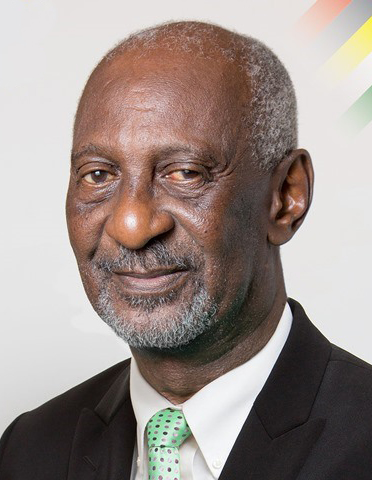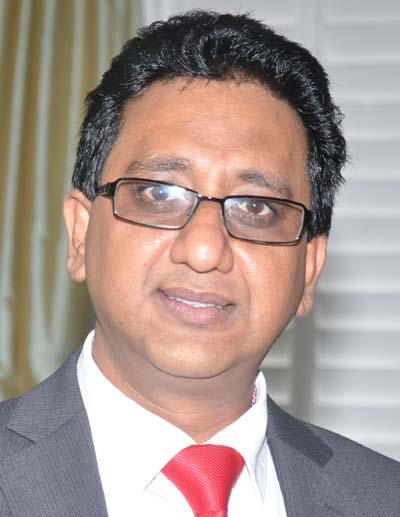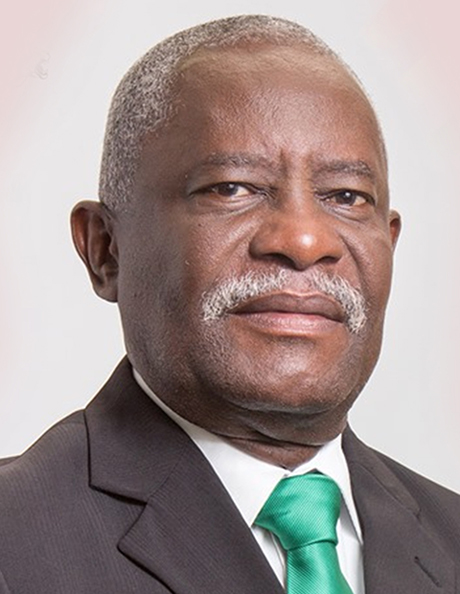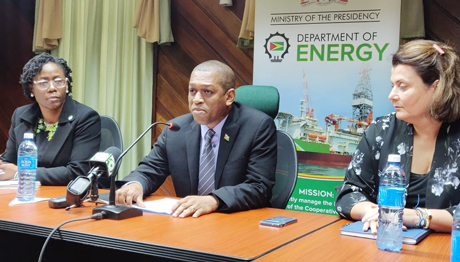Guyana Focus

It was tumultuous year on the political front in Guyana. Were it not for the distraction provided by the fledgling oil industry, 2019 could very well be classified as a year during which the final nail was driven in the coffin of democracy in Guyana.
Political turbulence from the onset of the year, stemming from a no-confidence vote in December 2018 continues to haunt the nation. While the country’s Constitution states that general elections should have been held no later than 90 days after the no-
confidence vote, that is, by March 2019, this never materialized. Neither did the government resign as is stipulated by the Constitution. Instead, the government challenged the validity of the vote in the local courts and lost. It subsequently appealed to the Caribbean Court of Justice (CCJ), and again lost.
On June 18, the CCJ ruled that elections be held within three months of its ruling, that is, by September 18. But this also did not materialize. Now, elections are scheduled for March 2020, one year after the original due date.
With general elections on the agenda, the appointment of the chairman of the Guyana Elections Commission (GECOM) also became a problematic issue which eventually reached the appeal process at the CCJ, following the rejection of 18 candidates proposed by the opposition PPP, by President David Granger.
However, the CCJ ruled that Granger failed to give sufficient and compelling reasons for rejecting the opposition-nominated candidates, setting the stage for the appointment of a supposed non-partisan candidate.
Once that candidate took office, a new can of worms was opened. GECOM decided to commence house-to-house registration of voters, a unilateral move that fell short of due process. Verification of the list of registrants has now turned out to be a challenging process, which is scheduled for completion early in the New Year.
With a date for elections now set, several fringe parties have emerged. In the meantime, after much discussion, the struggling AFC, which has endured its own leadership problems, struck a deal with APNU to remain a coalition partner.
In the meanwhile, the PPP’s choice of Presidential candidate, who will be the “sous chef” of former President Jagdeo, has turned out to be quite unpopular among the masses, putting the party at risk heading into the elections.
Outside of the political arena, developments in the fledgling oil sector proved to be a distraction from the ongoing political turmoil. Although a myriad of contentious issues have arisen over the favorable treatment Exxon has received from the government on the award of contracts, the good news is that Guyana is expected to begin shipping oil in December, two months earlier than anticipated.
Whether or not contracts were fairly awarded, and in the best interest of the country, remain questionable issues that may never be resolved.
Incidentally, oil production is projected to average 102,000 barrels/day (bpd) in 2020, rising to an average of 424,000 bpd by 2025. These projections could change with the discovery of additional oil resources as a result of ongoing exploration.
On the economic front, the economy is expected to grow by 4.4% in 2019, driven by continued strength in the construction and services sectors ahead of oil production in 2020, and a modest recovery in the mining sector. Incidentally, Guyana is forecasted to become one of the fastest growing economies in the world once oil production gets underway, putting the country on the radar of foreign investors.
Despite relatively strong economic growth, export performance has remained weak during the year, resulting from higher imports of high value inputs related to oil production, contributing to a weaker current account balance.
In a report on the Guyanese economy, the International Monetary Fund (IMF) was largely positive about current economic conditions, but made several recommendations, including the implementation of structural reforms to support economic diversification and achieve inclusive and equitable growth; adhering to a fiscal framework that constrains borrowing to achieve a balanced budget in the near-to-medium term; strengthening transparency and governance; and introducing exchange rate flexibility as part of the country’s monetary policy framework.
The international financial watchdog said that infrastructure bottlenecks, skilled labor shortages, and weaknesses in electricity supply are the major obstacles to growth in Guyana. Earlier, the IMF suggested the creation of a national development plan, a strategic initiative that has remained a shortcoming for many years.
The expectation of oil revenues raised numerous questions about the use of the country’s new found wealth, with widespread speculation that much of it could be wasted by the government. However, the government established the Natural Resource Fund (NRF) Act 2019 which includes a budget transfer rule that would ensures in the long-run that fiscal transfers are determined by the expected financial return on the accumulated assets of the NRF.
In the medium-term, the rule envisages a transfer of around half of current oil revenue to the budget. This will ensure that part of the oil revenue is saved as a buffer against shocks and for future generations; and that higher public expenditure will not lead to debt growing at the same time as the NRF accumulates.
The implementation of the country’s Green State Development Plan remained on the drawing board but appeared to have lost some steam during the year, in spite of much talk of various projects coming on stream. The government has so far outlined a range of initiatives, including the implementation of various tax and customs and excise measures to promote green development; and has committed to expanding the country’s protected areas by an additional two million hectares by 2020.
On the socio-economic front, criminals continued to unleash massive fear in Guyana. Though official crime statistics point to a decrease in crime, newspaper headlines and the people tell a completely different story, suggesting a dramatic increase. Numerous reports of the involvement of the police in criminal activities have caused the population to lose trust in law enforcement, casting a dark shadow over the possibility of an abatement in crimes.
In the meanwhile, the public fight against corruption was subdued during the year, although ongoing corruption and nepotism remained pervasive. While major incidences of narcotics trafficking have declined, the phenomenal rise in the use and distribution of synthetic drugs point to the evolution of a major problem.
With oil coming on stream, concerns of economic diversification, and the continued development of the agriculture sector, in particular, gained increased importance. However, agriculture continued to suffer from its traditional risks, including massive flooding and weak government support. Although inroads have been made in agro-processing, the country continued to import billions of dollars in foreign foods, pointing to the failure to make progressive strides in this area.
In the meantime, sugar is officially dead, while rice production has declined significantly. Given increased focus on the development of hinterland-based agriculture, combined with destructive flooding, the traditionally main agricultural producing regions have taken on the shape of “ghost towns.”
With parliament not functioning for the entire year, the power of the government has been somewhat reduced, although decision-making has not been stalled given the government’s stance that it is still constitutionally in power.
Paradoxically, the country still runs with a hope and prayer that elections in the New Year will usher in a new start.
whether Felix, Scott could sit as
Technocrat Ministers

Following lengthy arguments proffered to the Court of Appeal by Solicitor General, Nigel Hawke and Former Attorney General Anil Nandlall on behalf of the PPP, the court on Monday announced that it will rule in the matter on Wednesday, January 22, 2020. The appeal is being heard at the bench of Justices of Appeal Rishi Persaud and Dawn Gregory and High Court Judge Franklyn Holder. In his submissions to the court, Nandlall is asking that the appeal be dismissed with costs.

He submitted: “The challenge is solely directed to the President’s exercise of his powers to appoint Ministers, and having regard to the relevant provisions of the Constitution, the challenge is that Messrs. Felix and Scott are not qualified to be appointed Ministers under those provisions on the ground that they are elected members of the National Assembly and only non-elected members of the National Assembly can be appointed to those positions [as Technocrat Ministers].”

By Official Gazette publication, dated June 05, 2015, the Guyana Elections Commission, among other things declared the names of the persons who, as a result of the General and Regional Elections, were extracted to become members of the National Assembly. Nandlall noted that it is common knowledge that these Members of the National Assembly are elected members and have a right to vote.
In closing, he urged the court to deliver its ruling within a reasonable time, as this case raises constitutional issues of some importance. He said, “More likely than not, this issue will arise again when Ministers are to be appointed after the March 2020 Elections. It will therefore be of great assistance if a ruling can be given earliest by this Court, so that, if an Appeal is to be filed to the Caribbean Court of Justice, every effort can be made to have the hearing and determination of the same, expedited and concluded before March 2020.”
Government has always insisted that the ruling was something it cannot accept, as it is of the view that the ministers were properly appointed. In an appeal against the ruling, Government contended that Justice Chang’s ruling was bad in law and a breach of the principles of natural justice.
Contending that the ruling cannot be supported in law, Government has argued that Justice Chang “fell into grave error of law and misdirected himself in law, when he found that persons who are on the successful list of candidates are elected and therefore cannot qualify under Article 105 of the Constitution of Guyana to be ‘non-elected’ members of parliament and who have not been chosen or selected from the list of candidates to be Members of Parliament are excluded from being selected by the President as persons who are qualified to be elected as members of the National Assembly.”
In fact, Attorney General Basil Williams has argued that Chang also misdirected himself in law when he, “Failed to take into account that Article 163 (4) (a) of the Constitution of Guyana empowered Parliament to make provisions with respect to the circumstances and manner in which and the conditions upon which proceedings for the determination of any question under this article may be instituted in the High Court which Parliament did by enacting the National Assembly (Validity of Elections) Act, Cap. 1:04.”
One ground on which the appeal was filed is that at the time of delivering the ruling, Chang, who was the outgoing Chief Justice, was functus officio, which is used especially to define an officer who is no longer in office or of an instrument that has fulfilled its purpose.

Virginia Markouizos
Energy Director, Dr. Mark Bynoe, delivered a statement on a series of matters before the Energy Department ahead of First Oil, and provided a very limited window for questioning by media representatives. The principal matter – that of the trade of Guyana’s Liza crude – took up the bulk of the brief question and answer segment, and even that matter was not given complete clarity by the Energy Department.
Despite this, the Energy Director said that the press conference was the last one for the year, and that further notices will be published by way of press statements. This restricts the media corps’ ability to secure important details and cross-question the claims of Energy officials, for the information of the public, ahead of First Oil, which is on course to start in a matter of days.
Dr. Bynoe sought to assuage concerns about the circumstances of the bidding process to a series of oil companies, after an international publication, Bloomberg, notified the Guyanese people of the intended sale and its circumstances before Government did.
Bloomberg had noted that the face-to-face nature of the meeting is unusual for the type of sale. The Energy Director and his Crude Marketing Specialist Virginia Markouizos sought to convince the local press that Bloomberg did not tell the whole truth, and that the face-to-face meeting is a necessary avenue, since the initial discussions about the sale would also include discussions about the quality of the Liza crude, and not just the price. He insists that the choice was made in Guyana’s best interest.
Dr. Bynoe was asked why the Government is so reactive instead of proactive on matters such as this, and he said that all matters do not necessitate notifying the public during or before their execution. He said that some matters are better to be kept confidential, with notice provided when they have concluded.
Furthermore, when asked when the Department was going to notify the public about the bidding exercise, the Energy Director said that Government would have informed the public after all was said and done.
There have been multiple instances of reports being made by international publications like Bloomberg, on matters about which the Department of Energy has kept the Guyanese public in the dark.
Asked whether the bidding process will be accessible to the public, Dr. Bynoe said that it will be transparent every step of the way, and that Government will ensure the people are kept updated on developments as they occur. However, he said that the press will only be notified of important developments after the conclusion of the processes, as he has said that this is one of the cases for which it is better to tell the public after the fact.
His Crude Marketing Specialist, Markouizos, sought as well to put reporters at ease by telling them that the market will regulate itself. She said that the trading market requires transparency and that that requirement will encourage the traders to ensure their talks with Government are above board. Similarly, Dr. Bynoe said that Government’s interest in getting good terms for Guyana’s crude means that it will not allow any untoward business to be conducted.
“Government will be keen to share as much as it can when it can, to allow you to gain confidence that there’s nothing happening behind the scenes, nothing nefarious taking place,” the Director said.
recognition cameras

The three ports where emphasis is being placed is the Cheddi Jagan International Airport, Timehri; the Eugene F. Correia International Airport, at Ogle, and developing ports including the Guyana/Suriname crossing.
According to the Ministry of Public Telecommunication’s National Data Management Authority (NDMA), it is preparing to launch a major security initiative at the nation’s borders.
It will involve the installation of high quality surveillance cameras equipped with facial recognition and other top security monitoring features.
“This project which is set to come on stream soon, continues under the Safe City Solutions project being carried out in partnership with the Chinese Government tech giant Huawei Technologies…spearheading the security pro-ject which falls under the US$37.6 million venture that has already seen over 100 Closed Circuit Television (CCTV) high technology security cameras being installed around the country, particularly the capital Georgetown.”
According to Major (rtd) Floyd Levi, Head of the NDMA, preparations are still being made to have the ports wired.
Levi noted that with Guyana becoming a popular oil state and opening up to an influx of foreigners, the country would need to get even more serious about security at the borders.
The official noted that with the International Criminal Police Organization (Interpol) and US Homeland security’s watch list being a large one, it would be almost impossible for ordinary security personnel to keep up with the numerous wanted or potentially dangerous persons seeking to cross borders.
“That is why we would have to keep an eye on who is coming and who is going out. We don’t know some of these persons and we would want to have the best equipment that would help us recognize a potential threat before it gets within our society.”
Levi reminded that only at the nation’s borders will the country be implementing facial recognition features in regard to the cameras.
It was pointed out that that a small number of persons had raised concerns that this feature would be infringing on their privacy.
The NDMA head noted, however, that what the port cameras would allow when implemented is for the facial features of a potential suspect to be fed into a system and run against the individuals that may be present on a wanted list before alerting authorities to the potential threat.
“This is not something the ordinary citizen should be worried about,” Levi said”.
“This system is targeting those who would have broken the law and evading justice by crossing borders.”
The NDMA had recently announced that it had a total of 119 security cameras around the country with 17 strategic locations recently added. The cameras have been credited with solving a number of criminal activities around the country.
To advertise in ICW call
Call 905-738-5005